Incorporating varieties of fruits into your weight loss program is a smart and healthy choice. Some fruits are especially beneficial for weight loss programs due to their low calorie content, high fiber content, and rich nutrient profile. Among the essential must-have fruits for weight loss programs are berries, such as strawberries, blueberries, and raspberries, which are packed with antioxidants and fiber while being relatively low in calories. Citrus fruits like oranges and grapefruits are also excellent choices, as they are high in vitamin C, fiber, and water content, aiding in digestion and hydration. Apples, known for their high fiber content and satisfying crunch, can help keep you full for longer periods. Lastly, incorporating fruits like watermelon and Kiwi can be refreshing and hydrating while contributing minimal calories. Remember, incorporating a variety of fruits into your weight loss program can provide essential nutrients while adding delicious flavors to your meals.
DISCLOSURE: THIS POST MAY CONTAIN AFFILIATE LINKS, MEANING I GET A COMMISSION IF YOU DECIDE TO MAKE A PURCHASE THROUGH MY LINKS, AT NO ADDITIONAL COST TO YOU.
The following fruits provide vital nutrients while aiding digestion and keeping you satisfied.
Apples
Apples are low in calories and high in fiber, making them a great choice for weight loss. The fiber helps you feel full and satisfied for longer periods. 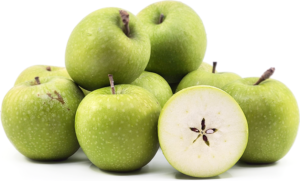
Nutritional Value (1 Cup, 165 grams)
Calories – 85; Carbohydrates – 22 grams; Fiber – 4 grams; Sugars – 18 grams; Fat – 0 grams;
Protein – 0 grams; Vitamin C – 7% of the Daily Value (DV); Potassium – 170 milligrams; Vitamin K – 5% of the DV
- Low in calories: Apples are relatively low in calories. A medium-sized apple contains about 95 calories, making it a satisfying snack without significantly contributing to your daily calorie intake.
- High in fiber: Apples are an excellent source of dietary fiber, both soluble and insoluble. The fiber content in apples helps promote feelings of fullness, reducing the chances of overeating. It also slows down the digestion process, preventing blood sugar spikes and helping to control cravings.
- Satisfies sweet cravings: Apples have a natural sweetness to them, which can help satisfy your sweet tooth without resorting to unhealthy sugary snacks or desserts. Choosing an apple as a snack instead of a high-calorie, sugary treat can aid in weight management.
- Hydration and satiety: Apples have high water content, contributing to hydration. Staying hydrated is essential for overall health and can support weight loss efforts. Additionally, the water content combined with the fiber in apples helps create a sense of fullness, helping you feel satisfied after consuming an apple.
- Nutrient-rich: Apples are packed with essential nutrients, including vitamins (such as vitamin C), minerals, and antioxidants. While weight loss is primarily about managing calorie intake, ensuring you receive adequate nutrients is crucial for overall health and well-being.
Berries
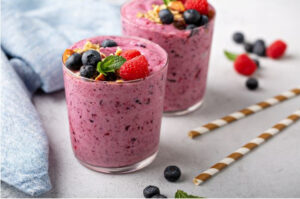
Berries such as strawberries, blueberries, raspberries, and blackberries are low in calories and packed with antioxidants. They are also high in fiber, which aids digestion and helps control cravings.
Nutritional Value (1 Cup, 165 grams)
Calories: 70-85 (depending on the specific berries); Carbohydrates: 15-20 grams (varying with different types of berries); Fiber: 4-8 grams (depending on the berries); Sugars: 7-15 grams (varies based on the berries); Fat: 0-1 gram (negligible amount); Protein: 1-2 grams (depending on the berries); Vitamin C: 25-50% of the Daily Value (DV) (varies by berry type); Vitamin K: 15-30% of the DV (varies by berry type);
Please note that the nutritional values mentioned above are general estimates and can vary depending on the specific types of berries included in the mix.
- Low in calories: Berries, such as strawberries, blueberries, raspberries, and blackberries, are generally low in calories. They provide natural sweetness without significantly contributing to your overall calorie intake. This makes them a satisfying and guilt-free snack option.
- High in fiber: Berries are rich in dietary fiber, which is essential for weight loss. Fiber promotes feelings of fullness and helps control appetite, reducing the chances of overeating. It also aids in digestion and can contribute to maintaining stable blood sugar levels.
- Low glycemic index: Berries have a relatively low glycemic index (GI), which means they have a minimal impact on blood sugar levels. Foods with a lower GI tend to provide sustained energy and help control cravings, making them beneficial for weight management.
- Antioxidant-rich: Berries are packed with antioxidants, including anthocyanins, which give them their vibrant colors. Antioxidants help combat oxidative stress and inflammation in the body, supporting overall health and well-being during weight loss.
- Water content: Berries have a high water content, which can contribute to hydration. Staying hydrated is essential for various bodily functions and can help manage hunger and cravings.
Grapefruit
Grapefruit is known for its metabolism-boosting properties. It is low in calories and high in vitamin C, which can help burn fat. 
Nutritional Value (1 Cup, 165 grams)
Calories – 52; Carbohydrates – 13 grams; Fiber – 2 grams; Sugars – 8 grams; Fat – 0 grams; Protein – 1 gram; Vitamin C – 64% of the Daily Value (DV); Vitamin A – 28% of the DV; Potassium – 5% of the DV
Grapefruit is also a good source of other essential vitamins and minerals such as vitamin B6, thiamine, folate, and magnesium. It is known for its high water content and its beneficial compounds like antioxidants, including flavonoids and limonoids.
- Low in calories: Grapefruit is relatively low in calories, making it a suitable choice for those aiming to lose weight. A half of a medium-sized grapefruit contains around 52 calories, making it a satisfying and refreshing snack option.
- High in fiber: Grapefruit is rich in dietary fiber, which is known to promote feelings of fullness and help control appetite. The fiber content in grapefruit can help reduce overall calorie intake by keeping you satisfied for longer periods and reducing the likelihood of overeating.
- Low glycemic index: Grapefruit has a relatively low glycemic index (GI), which means it does not cause significant spikes in blood sugar levels. Foods with a lower GI are generally beneficial for weight management, as they provide a steady release of energy and help control cravings.
- Rich in antioxidants: Grapefruit contains various antioxidants, such as vitamin C and other phytochemicals, which can help combat oxidative stress and inflammation in the body. These antioxidants contribute to overall well-being and support a healthy metabolism.
Watermelon 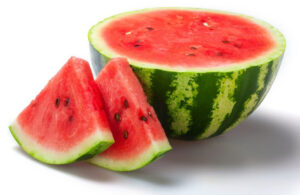
Watermelon has a high water content, which can help you feel full and hydrated. It is also low in calories and a good source of vitamins A and C.
Watermelon is also high in water content, which makes it a refreshing and hydrating fruit. It contains lycopene, a powerful antioxidant that gives it its vibrant red color. Additionally, watermelon provides small amounts of vitamins B6 and K, as well as other beneficial compounds like citrulline and cucurbitacin E.
Nutritional Value (1 Cup, 165 grams)
Calories – 46 grams; Carbohydrates – 11 grams; Fiber – 1 gram; Sugars – 9 grams; Fat – 0 grams; Protein – 1 gram; Vitamin C – 21% of the Daily Value (DV); Vitamin A – 18% of the DV; Potassium – 5% of the DV; Magnesium – 4% of the DV
- Low in calories: Watermelon is predominantly made up of water, making it a low-calorie fruit. It provides a refreshing and hydrating option without significantly contributing to your overall calorie intake. A cup of diced watermelon contains about 46 calories.
- High water content: As the name suggests, watermelon has a high water content, which can help keep you hydrated. Staying adequately hydrated is crucial for overall health and can support weight loss by promoting proper bodily functions and reducing the likelihood of confusing thirst with hunger.
- Satiety and portion control: Despite being low in calories, the high water and fiber content in watermelon can contribute to feelings of fullness and help control appetite. Including watermelon in your diet can help you feel satisfied with a smaller portion size, which may assist in managing overall calorie intake.
- Natural sweetness and low in fat: Watermelon is naturally sweet, making it a satisfying option when you have cravings for something sweet. It provides a healthier alternative to sugary snacks and desserts that are higher in calories and fat.
- Nutrient-rich: Watermelon is a good source of vitamins A and C, as well as other essential nutrients like potassium and lycopene. These nutrients are important for overall health and can support your weight loss journey by providing the body with necessary nutrients while keeping calorie intake in check.
Oranges
Oranges are rich in fiber, low in calories, and high in vitamin C. The fiber content aids digestion and helps control hunger.
Oranges are well-known for their high vitamin C content and are a good source of dietary fiber. They also contain smaller amounts of other vitamins and minerals like vitamin A, potassium, folate, and calcium. Oranges are low in calories and provide natural sugars along with beneficial plant compounds such as flavonoids and hesperidin.
Nutritional Value (1 Cup, 165 grams)
Calories – 85 grams; Carbohydrates – 21 grams; Fiber – 4 grams; Sugars – 17 grams; Fat – 0 grams; Protein – 2 grams; Vitamin C – 103% of the Daily Value (DV); Vitamin A – 11% of the DV; Potassium – 10% of the DV; Folate – 7% of the DV; Calcium – 6% of the DV
- Low in calories: Oranges are relatively low in calories, making them a satisfying and nutritious snack option for weight loss. A medium-sized orange contains around 60-80 calories, depending on the variety.
- High in fiber: Oranges are an excellent source of dietary fiber, both soluble and insoluble. The fiber content aids digestion, promotes feelings of fullness, and helps control appetite. It can also contribute to stable blood sugar levels, reducing the likelihood of cravings and overeating.
- Hydration: Oranges have a high water content, which can contribute to hydration. Staying properly hydrated is essential for overall health and can support weight loss by supporting proper bodily functions and reducing the chances of mistaking thirst for hunger.
- Vitamin C content: Oranges are well-known for their high vitamin C content. Vitamin C is an antioxidant that supports immune function and promotes overall health. While its direct impact on weight loss may be limited, maintaining overall health is crucial during the weight loss process.
Kiwi
Kiwi is a nutrient-dense fruit that is low in calories and high in fiber. It also contains an enzyme called actinidin, which aids digestion. 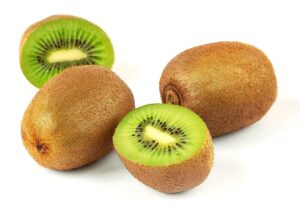
Kiwi is a nutrient-dense fruit that is particularly rich in vitamin C, providing more than the daily recommended intake in just one cup. It is also a good source of dietary fiber and contains moderate amounts of vitamin K, vitamin E, potassium, and folate. Kiwi is known for its vibrant green flesh and its unique combination of sweet and tart flavors.
Nutritional Value (1 Cup, 165 grams)
Calories – 108; Carbohydrates – 26 grams; Fiber – 5 grams; Sugars – 16 grams; Fat – 1 gram; Protein – 2 grams; Vitamin C – 167% of the Daily Value (DV); Vitamin K – 38% of the DV; Vitamin E – 10% of the DV; Potassium – 9% of the DV; Folate – 6% of the DV
- Low in Calories: Kiwi is relatively low in calories, making it a great choice for those aiming to lose weight. With only around 40-50 calories per fruit, kiwi allows you to enjoy a satisfying snack without consuming excessive calories.
- High in Fiber: Kiwi is a fantastic source of dietary fiber, which is known to promote feelings of fullness and aid in weight management. The fiber content in kiwi can help regulate digestion, reduce hunger, and prevent overeating, making it a beneficial addition to a weight loss diet.
- Supports Digestive Health: Kiwi contains a unique enzyme called actinidin, which aids in the breakdown of proteins and promotes healthy digestion. By supporting efficient digestion, kiwi can help prevent bloating, constipation, and other digestive issues that may hinder weight loss progress.
- Rich in Vitamins and Minerals: Kiwi is packed with essential vitamins and minerals, including vitamin C, vitamin K, vitamin E, folate, and potassium. These nutrients are vital for overall health and can support optimal functioning of the body’s systems. When you nourish your body with nutrient-rich foods like kiwi, you promote overall wellness, which is essential for sustainable weight loss.
- Natural Antioxidant Power: Kiwi is a rich source of antioxidants, which play a crucial role in combating oxidative stress and inflammation in the body. By reducing inflammation, kiwi can support weight loss efforts, as chronic inflammation has been linked to weight gain and metabolic disturbances.
Papaya
Papaya is low in calories, high in fiber, and rich in enzymes that aid digestion. It also contains papain, which can help break down proteins and improve digestion.
Papaya is a tropical fruit that is rich in vitamins and minerals. It is particularly high in vitamin C, providing more than the recommended daily intake in just one cup. Papaya is also a good source of vitamin A, folate, and potassium. Additionally, it contains digestive enzymes like papain, which may aid in digestion. Papaya has a sweet and juicy taste and is often enjoyed fresh or used in various culinary dishes. 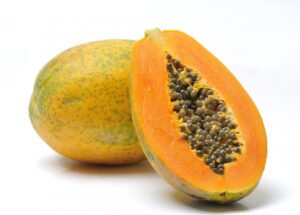
Nutritional Value (1 Cup, 165 grams)
Calories – 62; Carbohydrates – 16 grams; Fiber – 3 grams; Sugars – 11 grams; Fat – 0 grams; Protein – 1 gram; Vitamin C – 144% of the Daily Value (DV); Vitamin A – 31% of the DV; Folate – 13% of the DV; Potassium – 9% of the DV
- Low in Calories: Papaya is a relatively low-calorie fruit, making it a smart choice for weight-conscious individuals. A serving of papaya contains approximately 60-70 calories, allowing you to enjoy a satisfying portion without consuming excessive calories.
- High in Fiber: Papaya is rich in dietary fiber, which aids in digestion and promotes feelings of fullness. The fiber content in papaya can help regulate bowel movements, prevent constipation, and support healthy gut function. By promoting satiety, fiber helps control appetite and reduces the likelihood of overeating, which is beneficial for weight management.
- Enzymes Aid Digestion: Papaya contains an enzyme called papain, which aids in the digestion of proteins. This enzyme can help improve overall digestion and nutrient absorption. When your body digests food efficiently, it can support weight loss efforts by maximizing nutrient utilization and minimizing digestive discomfort.
- High Water Content: Papaya has a high water content, contributing to hydration. Staying hydrated is essential for weight loss, as it helps maintain proper bodily functions and can aid in appetite control. Including water-rich fruits like papaya in your diet can help you meet your daily fluid intake goals.
- Rich in Nutrients: Papaya is packed with essential vitamins and minerals, including vitamin C, vitamin A, folate, and potassium. These nutrients are vital for overall health and can support various bodily functions. By nourishing your body with nutrient-dense foods like papaya, you promote overall wellness, which is crucial for sustainable weight loss.
- Natural Antioxidants: Papaya is a rich source of antioxidants, such as vitamin C and beta-carotene. Antioxidants help fight free radicals, which can cause cellular damage and contribute to inflammation. By reducing inflammation, papaya can support weight loss efforts, as chronic inflammation has been linked to weight gain and metabolic imbalances.
Pineapple
Pineapple contains an enzyme called bromelain, which can aid digestion and reduce inflammation. It is also low in calories and a good source of vitamin C.
Pineapple is a delicious tropical fruit that offers a range of nutrients. It is known for its high vitamin C content, providing more than the recommended daily intake in just one cup. Pineapple is also a good source of manganese, a mineral involved in various metabolic processes.
Nutritional Value (1 Cup, 165 grams)
Calories – 82; Carbohydrates – 22 grams; Fiber – 2.3 grams; Sugars – 16 grams; Fat – 0.2 grams; Protein – 0.9 grams; Vitamin C – 105% of the Daily Value (DV); Manganese – 77% of the DV; Vitamin B6 – 9% of the DV; Folate – 7% of the DV; Potassium – 5% of the DV
Pineapple can be a beneficial addition to a weight loss diet due to several reasons:
- Low in Calories: Pineapple is relatively low in calories, with approximately 82 calories per one cup (165 grams). This makes it a satisfying and flavorful snack option that can be included in a calorie-controlled diet.
- High in Fiber: Pineapple is a good source of dietary fiber, with about 2.3 grams of fiber per cup. Fiber helps promote feelings of fullness, which can aid in controlling appetite and preventing overeating.
- Hydration Support: Pineapple has a high water content, which can contribute to hydration. Staying hydrated is important for weight loss as it helps maintain optimal body functions and can help reduce cravings.
- Natural Digestive Enzymes: Pineapple contains bromelain, a mixture of enzymes that aid in digestion. Bromelain can help break down proteins and support the digestion process, potentially improving nutrient absorption and reducing bloating or digestive discomfort.
- Low in Fat: Pineapple is a virtually fat-free fruit. Including low-fat and fat-free foods in your diet can help reduce overall calorie intake and contribute to weight loss efforts.
- Nutrient Dense: Pineapple is rich in various vitamins and minerals, including vitamin C, manganese, vitamin B6, and folate. These nutrients are important for overall health and can support your weight loss journey by providing essential nutrients while keeping your calorie intake in check.
Avocado
While technically a fruit, avocados are rich in healthy fats and fiber. They can help you feel satisfied and provide essential nutrients for weight loss.
Avocado, often hailed as a superfood, offers several benefits that can support weight loss efforts. Here are some of the key benefits of avocado for weight loss: 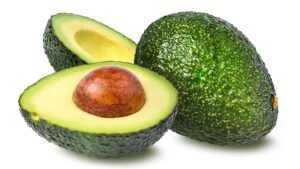
Nutritional Value (1 Cup, 165 grams)
Calories – 234 grams; Carbohydrates – 12 grams; Fiber – 10 grams; Sugars – 0.7 grams; Fat – 21 grams; Protein – 3 grams; Vitamin K – 26% of the Daily Value (DV); Folate – 20% of the DV; Vitamin C – 17% of the DV; Potassium – 14% of the DV; Vitamin E – 14% of the DV
Avocado is unique among fruits because it is high in healthy fats, particularly monounsaturated fats, which are beneficial for heart health. While avocados do contain calories and fats, they are nutrient-dense and offer various vitamins and minerals.
- High in Healthy Fats: Avocado is rich in monounsaturated fats, which are considered healthy fats. These fats can help you feel satiated and satisfied, reducing the likelihood of overeating or snacking on unhealthy foods. Including moderate amounts of avocado in your meals can contribute to a feeling of fullness, aiding in portion control.
- Fiber-Rich: Avocados are an excellent source of dietary fiber. High-fiber foods are known to promote feelings of fullness and can help regulate appetite. By including avocados in your diet, you can promote better digestion, reduce cravings, and maintain a healthy weight.
- Nutrient Density: Avocados are packed with essential vitamins and minerals, including potassium, folate, vitamin K, vitamin E, and vitamin C. Despite being relatively high in calories, avocados offer a range of nutrients that contribute to overall health. When consumed as part of a balanced diet, avocados can provide your body with the necessary nutrients while supporting weight loss goals.
- Blood Sugar Regulation: The monounsaturated fats in avocados, along with their high fiber content, can help stabilize blood sugar levels. By preventing spikes and crashes in blood sugar, avocados can support a steady release of energy, reducing the likelihood of sudden hunger pangs and cravings for sugary snacks.
It’s important to note that while avocados offer numerous benefits for weight loss, they should still be consumed in moderation due to their calorie content. Additionally, for optimal results, it’s crucial to combine avocado consumption with a balanced diet and regular physical activity.
Always consult with a healthcare professional or a registered dietitian before making significant changes to your diet, especially if you have any underlying health conditions or concerns.
Remember, while these fruits can be beneficial for weight loss, it’s important to maintain a balanced diet and engage in regular physical activity for overall health and weight management.

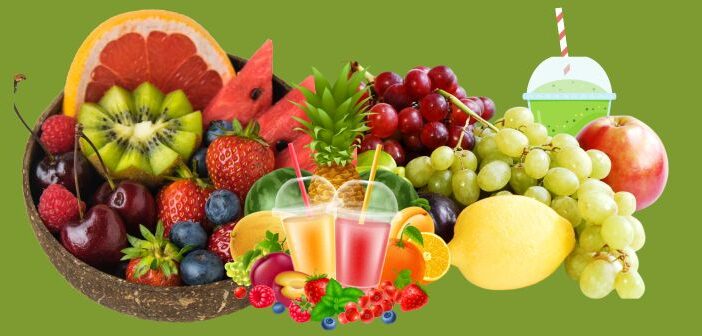




2 Comments
Pingback: Afrobeats: The Nigerian, Ghanaian and Caribbean Connection
Pingback: Sub-Saharan Africa’s Gaming Industry to Surpass $1 Billion by 2024 – Analyst